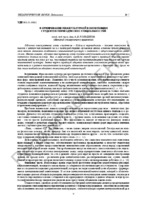| dc.contributor.author | Конышева, А. В. | ru |
| dc.coverage.spatial | Новополоцк | ru |
| dc.date.accessioned | 2018-03-14T13:55:18Z | |
| dc.date.available | 2018-03-14T13:55:18Z | |
| dc.date.issued | 2015 | |
| dc.identifier.citation | Конышева А. В. Формирование межкультурной компетенции студентов переводческих специальностей / А. В. Конышева // Вестник Полоцкого государственного университета. Серия Е: Педагогические науки. - 2015. - № 7. - С. 9-13. | ru |
| dc.identifier.uri | https://rep.bntu.by/handle/data/38701 | |
| dc.description.abstract | Обучение иностранному языку студентов – будущих переводчиков - должно знакомить не только с языком как таковым, но и с культурой страны изучаемого языка, а также путем сравнения язык может оттенять особенности национальной культуры и знакомить с общечеловеческими ценностями. Иными словами, обучение иностранному языку должно содействовать воспитанию студентов в контексте диалога культур. Это, в свою очередь, требует знаний норм и традиций общения народа-носителя языка, то есть все то, что подразумевается под коммуникативным поведением как частью национальной культуры. | ru |
| dc.language.iso | ru | ru |
| dc.publisher | Полоцкий государственный университет | ru |
| dc.subject | Компетентность иноязычная | ru |
| dc.subject | Межкультурная компетентность | ru |
| dc.title | Формирование межкультурной компетенции студентов переводческих специальностей | ru |
| dc.title.alternative | Formation of the intercultural competence to students of translation professions | en |
| dc.type | Article | ru |
| local.description.annotation | Learning a foreign language to students – future interpreters – should inform not only with the language as itself, but with the culture of the country whose language is studying, as well as by comparing the language may overshadow the peculiarities of national culture and acquaint with universal values. In other words, learning a foreign language is to contribute to the education of students in the context of dialogue of cultures. This in its turn requires the knowledge of norms and traditions of communication of people – native speakers, that is all meant by communication behavior as part of the national culture. Knowledge of the rules and traditions of communication allows to the participants of the speech act, belonging to different national cultures, adequately perceive and understand each other, but to do this it is necessary to possess the intercultural competence. | en |

